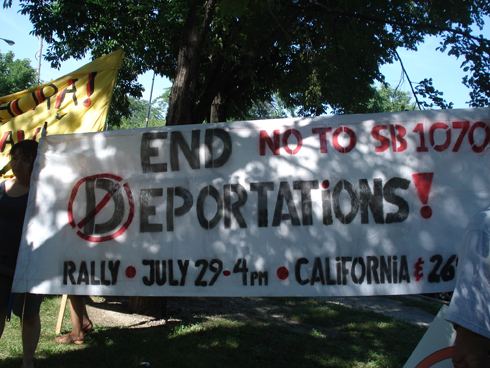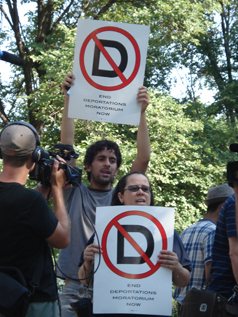A federal judge’s ruling has prevented the most contested parts of SB1070, Arizona’s contested immigration law, from taking effect, but protests and recrimination have shown that feelings in the state remain far from friendly.
The SB1070 legislation went into effect at 12:01 a.m. Thursday, but significant portions of the laws were enjoined by a federal court order ruling in a lawsuit brought by the Obama administration.
Under the revised version of the bill, police will not be required to check the immigration status of individuals they suspect of being undocumented immigrants, and immigrants without papers will not face state misdemeanor charges, as is mandated in the version of SB 1070 signed into law by Governor Jan Brewer on April 23, 2010.

Immigrant rights activists in Chicago protest SB1070 and call for a moratorium on deportations. (Photo: Yana Kunichoff)
“The partial and temporary blocking of a law that should’ve never existed is welcome but in no way a victory,” said Pablo Alvarado, executive director of the National Day Laborer Organizing Network. “The conditions that created SB 1070 remain and are only worsened by the decision today.”
Federal Judge Susan R. Bolton, of Arizona’s District Court, also halted provisions of the law which would have made it a crime for an undocumented immigrant to solicit work in Arizona, saying this and other aspects should be enjoined until a trial takes place to decide whether the Arizona law interfered with federal authority on immigration and subjected legal residents to unwarranted scrutiny.
However, Thursday morning ushered in a few of SB1070’s less publicized aspects. It is now a crime to stop a car in the street and pick up a day laborer, and police officers were given new powers to impound vehicles used to transport undocumented immigrants. The latter provision, aimed at migrant smugglers, could also apply to church groups or individuals who have family members of mixed immigration status.
As expected, Arizona’s Governor Brewer, seeking reelection for a full term, quickly jumped to appeal Judge Bolton’s decision. The court is scheduled to hear oral arguments in September, and there are still five other lawsuits against SB1070 which have yet to be taken up in court, brought by individuals, civil rights groups and police officers.
Protesters gathered in New York, Los Angeles, Chicago, Milwaukee, Louisville, Tucson, Ecuador, Spain and Mexico to make their voices heard against Arizona’s anti-immigrant law as it took effect Thursday. In New York, the protesters shut down the Brooklyn Bridge.
Faith leaders, union leaders and activists from all over the country were among hundreds of protesters in Arizona who began marching before dawn, saying Arizona remains inhospitable to immigrants despite the injunction. At least 50 people were arrested during protests and acts of civil disobedience, along with at least one lawyer from the Center for Constitutional Rights, who was taken into custody while writing down the names of individuals being arrested.
Protesters also shut down Sherriff Joe Arpaio’s office in Phoenix, forcing him to delay his 17th sweep on Thursday.
Rinku Sen, president and executive director of the Applied Research Center, credited the many protests leading up to the court injunction with pressuring the Obama administration into suing Arizona over SB1070.
“I think it’s had an enormous effect,” Sen said of the slew of protests leading up to the injunction. Anti-immigrant legislation relies on the crossing of lines “that American are willing to tolerate, and SB1070 crosses that line. This fight has activated unusual actors such as baseball players and musicians, who are not leading the debate but responding to it,” she said of the public figures who have agreed to boycott Arizona over SB1070.
Not all reactions to the ruling were peaceful – Congressman Raul Grijalva (D-Arizona) was forced to shut down his district office after a bullet shattered a window, and Judge Bolton received hundreds of threats at her court offices following her ruling to throw out portions of the law.
A rally is planned for Saturday by those who support the law, including State Senator Russell Pearce, the Republican who sponsored it and who predicted that the injunction would be lifted.
On the ground, many of Arizona’s recent measures targeting undocumented aliens are still in place. Since 2004, the state has tightened requirements on ID needed to vote, limited the ability of undocumented immigrants to post bail after they have been arrested, and worked to dissolve companies that hire workers without papers. Recent laws have eliminated a Mexican-American studies program and stopped teachers with accents from teaching some public school classes.
In addition to this, Arizona is already the launching ground for 287(g), a measure which delegates immigration enforcement to local police officers. Mark Spencer, board president of the Pheonix Law Enforcement Association, a strong backer of SB1070, said it would only have legalized tactics already widely used in Phoenix. “We were test-driving SB 1070” in Phoenix, Spencer said. “Now we’re going to take it on a long-term road trip. Nothing changed for the Phoenix Police Department.”
Sen noted that despite the judicial challenge to SB1070, “racial profiling as a practice doesn’t get challenged,” an element that could prove problematic as nearly 20 other states consider similar legislation.
Our most important fundraising appeal of the year
December is the most critical time of year for Truthout, because our nonprofit news is funded almost entirely by individual donations from readers like you. So before you navigate away, we ask that you take just a second to support Truthout with a tax-deductible donation.
This year is a little different. We are up against a far-reaching, wide-scale attack on press freedom coming from the Trump administration. 2025 was a year of frightening censorship, news industry corporate consolidation, and worsening financial conditions for progressive nonprofits across the board.
We can only resist Trump’s agenda by cultivating a strong base of support. The right-wing mediasphere is funded comfortably by billionaire owners and venture capitalist philanthropists. At Truthout, we have you.
We’ve set an ambitious target for our year-end campaign — a goal of $225,000 to keep up our fight against authoritarianism in 2026. Please take a meaningful action in this fight: make a one-time or monthly donation to Truthout before December 31. If you have the means, please dig deep.
